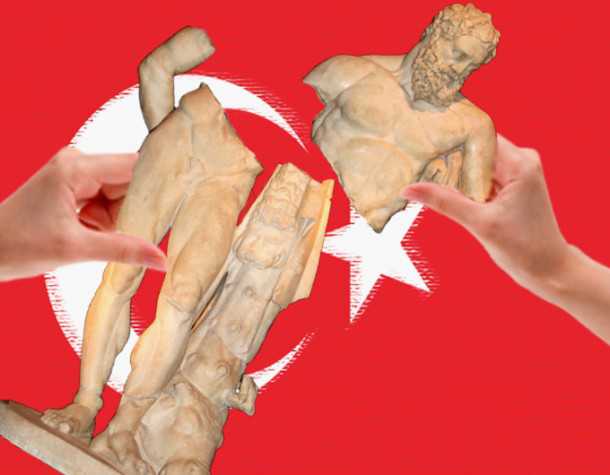By Jonathon Burch and Gulsen Solaker | Reuters
ANKARA (Reuters) – Turkish Prime Minister Tayyip Erdogan said on Wednesday military operations against Kurdish rebels would continue until they laid down their arms, as Turkish media reported warplanes had bombed militants in northern Iraq for a third day.
The prospect of an end to three decades of war between the Turkish state and the Kurdistan Workers Party (PKK) has gained momentum in recent weeks since the government acknowledged it was talking to the insurgents’ jailed leader.
Erdogan, under pressure to bring an end to the violence, has said his government’s renewed peace efforts are sincere but has also maintained Ankara’s hard-line rhetoric on a conflict that has burned for 30 years.
“We want a solution with all our hearts, but to achieve this we will never compromise our dignity,” Erdogan told members of his ruling AK Party at their headquarters in Ankara.
“Until the terror organization lays down its arms, until they end their attacks, our security forces will continue their operations,” he said, describing the nascent peace talks as a “test of sincerity”.
Turkish warplanes bombed PKK targets in northern Iraq again overnight, according to media reports. Broadcaster CNN Turk said on Tuesday jets had also attacked PKK forces there on Sunday and Monday, in the first such raids since details of talks with PKK leader Abdullah Ocalan emerged.
Firat news agency, which has close links to the PKK, reported on Wednesday that seven PKK fighters had been killed this week in air strikes.
There was no official Turkish confirmation of the raids.
Turkey is still reeling from one of the most violent summers since the PKK took up arms against the state in 1984. More than 40,000 people, mostly Kurds, have been killed since then.
Late last year Turkish intelligence officials began talks with Ocalan, imprisoned on an island south of Istanbul. Those talks have drawn fierce criticism from nationalist circles which accuse the government of going soft on the PKK.
They were overshadowed last week by the execution-style killings of three Kurdish women activists in Paris, which Erdogan has suggested could be the result of an internal feud in the PKK or a bid to derail the peace moves.
The PKK has blamed shadowy elements within the Turkish state or foreign powers and Ocalan issued a call on Monday through his brother for French police to solve the murders. But he gave no indication their killing would disrupt the peace talks.
PROVOCATION
Erdogan’s government has widened cultural and language rights for Kurds, who make up about 20 percent of Turkey’s population, since taking power 10 years ago. Kurdish politicians say the reforms do not go far enough.
While spelling out its demands from the insurgents, the government has given little hint of what concessions, if any, it might be willing to make. The PKK, like most Kurds in Turkey, still see “political autonomy” as one of their main demands in any solution to the Kurdish problem.
“Mr. Erdogan needs to understand that disarming the PKK won’t come at the beginning of the peace process, but at the end,” Aliza Marcus, a journalist who has written a book on the PKK, wrote in a New York Times op-ed column on Wednesday.
“To silence the PKK’s guns while talks are under way, Turkey will also have to suspend its military operations against rebels in the southeast and in northern Iraq,” she wrote.
The bodies of the three women killed in Paris, one of whom was a co-founder of the PKK, were set to be flown to Diyarbakir, the largest city in Turkey’s mainly Kurdish southeast, on Wednesday evening ahead of a funeral ceremony on Thursday.
Erdogan repeated his and other political leaders’ call on Wednesday for calm at the funerals and said security forces would be “extremely sensitive and vigilant” against any provocation or sabotage.
“We expect politicians, as responsible authorities, to display the same sensitivity,” he said.
Co-leader of Turkey’s pro-Kurdish Peace and Democracy Party (BDP), Selahattin Demirtas, who has thrown his support behind the latest government peace efforts, played down the warnings, saying any provocation would not come from the people.
“Why would the people start any provocation? If the security forces think there is a possibility of provocation, if the government is making such a fuss, then they should quietly prevent this,” Demirtas told reporters in Diyarbakir.
(Additional reporting by Seyhmus Cakan in Diyarbakir; Writing by Jonathon Burch; Editing by Nick Tattersall and Andrew Roche)
via Turkey to pursue Kurdish rebels until they lay down weapons: PM – Yahoo! News.


Leave a Reply